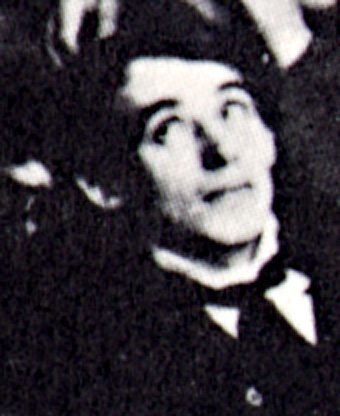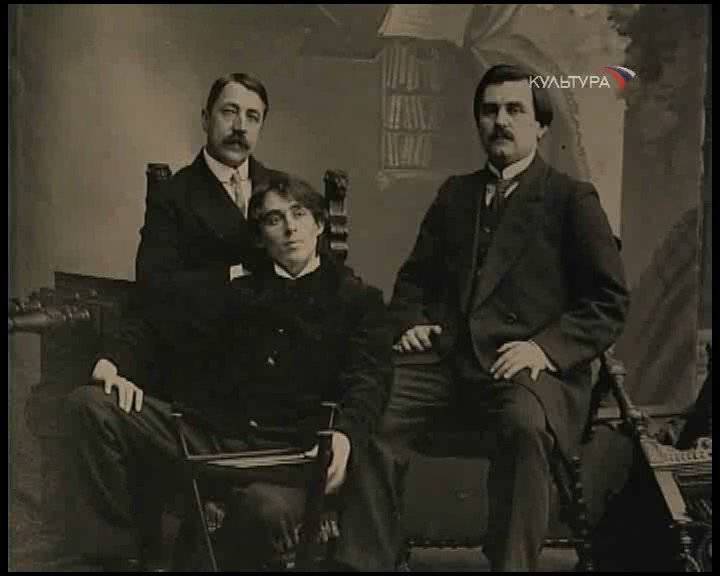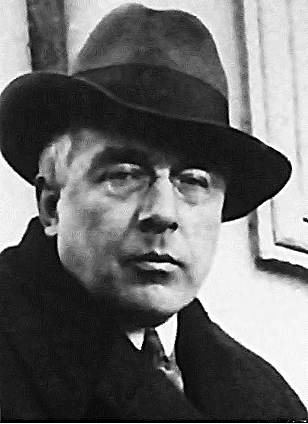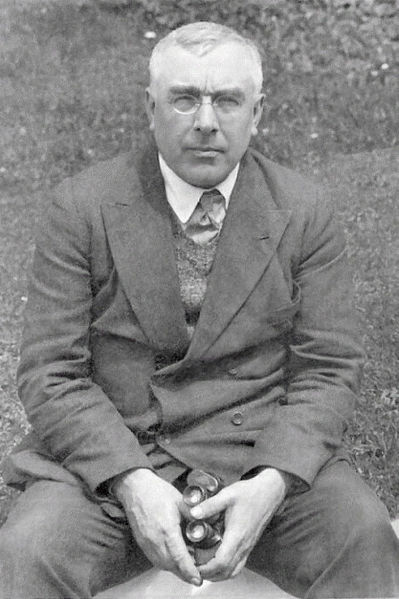<Back to Index>
- Poet Aleksei Eliseevich Kruchenykh, 1886
- Esotericist Pyotr Demianovich Uspenskii, 1878
PAGE SPONSOR


Aleksei Yeliseyevich Kruchyonykh (Russian: Алексе́й Елисе́евич Кручёных; 9 February 1886 – 17 June 1968) was a Russian poet, artist, and theorist, perhaps one of the most radical poets of Russian Futurism, a movement that included Vladimir Mayakovsky, David Burliuk and others. Born in 1886, he lived in the time of the Russian Silver Age of literature, and together with Velimir Khlebnikov, another Russian Futurist, Kruchenykh is considered the inventor of zaum, a poetry style utilising nonsense words. Kruchonykh wrote the libretto for the Futurist opera Victory Over the Sun, with sets provided by Kazimir Malevich. In 1912, he wrote the poem Dyr bul shchyl; four years later, in 1916, he created his most famous book, Universal War.
He is also known for his Declaration of the Word as Such (1913): "The worn-out, violated word "lily" is devoid of all expression. Therefore I call the lily éuy – and original purity is restored."
Kruchonykh was born on 21 February 1886, in the Kherson region of Russia; his parents were peasants. With the intention of becoming an artist, he went to Odessa Art School and the Moscow School of Painting, Sculpture and Architecture, publishing caricatures and occasionally exhibiting to make a living, but changed his mind in 1912 to be a poet instead.
Soon after he met the Burliuk brothers, he became a major poet of
Cubo-Futurism, a style he helped to launch with his friends David
Burliuk, Vladimir Mayakovsky, Mikhail Larionov, and others. He helped
write the drafts for the most famous Cubo-Futurist manifesto, A Slap in the Face of Public Taste, published in 1912, notable for its statement to throw the writers of old "off the steamboat of modernity". The first example of zaum poetry was by him; called Dyr bul shchyl, it was published in a 1913 book called Pomada. Together with Velemir Khlebnikov,
he is considered inventor of this poetry style. Kruchenykh was also the
first Russian poet to try writing a poem only using vowels. Soon he
became one of the most prolific Cubo - Futurist writers, alongside Elena
Guro, Khlebnikov, and others. The books were often lithographed by
hand, illustrated by fellow Futurists, and titles included A Little Duck's Nest of... Bad Words, Hermits: a Poem, Worldbackwards, and Explodity. They were also sometimes in collaboration with each other; for example, with Olga Rozanova, he invented the samopismo, a kind of Futurist book where text and images are literally connected.
He went to the house of the composer Mikhail Matyushin with Kazimir Malevich that summer (Khlebnikov was supposed to visit him too, but he lost the cheque to pay for his train ticket that Matyushin had sent him); they collaborated to write the Futurist opera Victory over the Sun, with music by Matyushin, prologue by Khlebnikov, libretto by Kruchenykh, and set designs by Malevich. This opera remains his most famous work; it is about a group of Futurists who capture the sun and defy gravity, much to the annoyance to everybody else. It premiered at the Luna Park Theatre at St. Petersburg, in a performance organised by the Union of the Youth. This play was written in a sort of zaum, the costumes were of cardboard, and a real aeroplane and aviator made an appearance; the audience booed throughout the show, and overall it caused great outrage. He, like his friends, also caused shock when he took to lecturing and poetry recitals, and on one occasion, he had to use his shoes to fight back the enraged audience from leaping up and attacking him. Another time, he spilled tea over many of the audience, an event which was probably intentional. Universal War was published in 1916; he illustrated it himself, with abstract collages. During the war he served as a technical draftsman.
Shortly after the October Revolution of 1917, he moved to Tiflis, Georgia, as part of a railway construction team; with his friend the Georgian Cubo-Futurist Ilia Zdanevich, who also happened to be in the country, they founded the avant-garde group 41° (the number refers to the temperature of a high fever). There, also, somebody founded an institute devoted to the study of his work and life so far, but this was probably just a joke. After Zdanevich left Georgia (first to Turkey, then to France), Kruchenykh returned to Russia in 1921, publishing more books, writing essays, and lecturing with friends; his views soon became so shocking the authorities decided to restrict his access to publishers, so he made his books himself. When the Soviets banned the avant-garde, he got a job as an archivist and gave up poetry. He also collected and sold rare books and manuscripts written by the people of his generation, eventually falling into obscurity with only occasional acknowledgment from the public. In 1932 he wrote his memoirs. He died of pneumonia in 1968.
The Russian punk band Grazhdanskaya Oborona have a reggae - styled song called "Posveshtenie A. Kruchyonykh" (Homage to A. Kruchyonykh) on their 1990 concept album Instruktsiya po vyzhivaniyu.


Peter D. Ouspensky (March 4, 1878 – October 2, 1947), (Pyotr Demianovich Ouspenskii, also Uspenskii or Uspensky, Пётр Демья́нович Успе́нский), a Russian esotericist known for his expositions of the early work of the Greek - Armenian teacher of esoteric doctrine George Gurdjieff, whom he met in Moscow in 1915.
He was associated with the ideas and practices originating with Gurdjieff from then on. In 1924, he separated from Gurdjieff personally, and some, including Rodney Collin among others, say that he finally gave up the (Gurdjieff) "system" that he had shared with people for 25 years in England and the United States, but his own recorded words on the subject ("A Record of Meetings," published posthumously) do not clearly endorse this judgement nor does Ouspensky's emphasis on "you must make a new beginning" after confessing "I've left the system"; all this happened in Lyne Place, Surrey, England, in 1947, just before his demise. While lecturing in London in 1924 he announced that he would continue independently the way he began in 1921. All in all, Ouspensky studied the Gurdjieff System directly under Gurdjieff's own supervision for a period of ten years, from 1915 to 1924. Ouspenky's book In Search of the Miraculous is a recounting of what Ouspensky learned from Gurdjieff during those years.
Ouspensky was born in Moscow in 1878. In 1890, he was studying in the Second Moscow Gymnasium, a government school attended by boys from ten to eighteen. At the age of sixteen, he was expelled from school for painting graffiti on the wall in plain sight of a visiting inspector to see; thereafter, he would be more or less on his own. In 1906, he was working in the editorial office of the Moscow daily paper The Morning. In the autumn of 1913, age 35, before the beginning of World War I, he journeyed to the East in search of the miraculous but returned to Moscow shortly after the beginning of the great world war. There he met Gurdjieff and took in Mme Sophie Grigorievna Maximenko as his wife but he had a mistress by the name of Anna Ilinishna Butkovsky.
His first book, The Fourth Dimension, appeared in 1909; his second book, Tertium Organum, in 1912; and A New Model of the Universe in 1931. This last work discusses the idea of esotericism. He also wrote the novel Strange Life of Ivan Osokin, which explored the concept of recurrence or eternal return. He traveled in Europe and the East — India, Ceylon, and Egypt — in his search for knowledge. After his return to Russia and his introduction to Gurdjieff in 1915, Ouspensky spent the next few years studying with him. According to Osho, when Ouspensky went to Gurdjieff for the first time, the latter was but an unknown fakir and Ouspensky made him well known to his own reading public.
Denying the ultimate reality of motion in his book Tertium Organum, he also negates Aristotle's Logical Formula of Identification of "A is A" and finally concludes in his "higher logic" that A is both A and not-A without specifying that in Aristotle's formula A can be both A and not A but not at the same time.
Unbeknownst to Ouspensky, a Russian émigré by the name of Nicholas Bessarabof took a copy of Tertium Organum to America and placed it in the hands of the architect Claude Bragdon who could read Russian and was interested in the fourth dimension. Tertium Organum was rendered into English by Bragdon who had incorporated his own design of the hypercube into the Rochester Chamber of Commerce building. Bragdon also published the book and the publication was such a success that it was finally taken up by Alfred A. Knopf. At the time, in the early 1920s, Ouspensky's whereabouts were unknown until Bragdon located him in Constantinople and paid him some back royalties.
Ouspensky's lectures in London were attended by such literary figures as Aldous Huxley, T.S. Eliot, Gerald Heard and other writers, journalists and doctors. His influence on the literary scene of the 1920s and 1930s as well as on the Russian avant garde was immense but still very little known.
Ouspensky also provided an original discussion of the nature and expression of sexuality in his A New Model of the Universe; among other things, he draws a distinction between erotica and pornography.
During his years in Moscow, Ouspensky wrote for several newspapers and was particularly interested in the then fashionable idea of the fourth dimension. His first published work was titled The Fourth Dimension and he explored the subject along the ideas prevalent at the time in the works of Charles H. Hinton, the fourth dimension being an extension in space. Ouspensky treats time as a fourth dimension only indirectly in a novel he wrote titled Strange Life of Ivan Osokin where he also explores the theory of eternal recurrence.
After the Bolshevik revolution, Ouspensky traveled to London by way of Istanbul. G.R.S. Mead became interested in the fourth dimension and Lady Rothermore, wife of the press magnate, was willing to spread the news of Ouspenky's Tertium Organum, while Ouspensky's acquaintance A.R. Orage was telling others about Ouspensky. By order of the British government, Gurdjieff was not allowed to settle down in London. Finally, he went to France with a considerable sum of money raised by Ouspensky and his friends and settled down near Paris at the Prieuré in Fontainbleau, Avon. It was during this time, after Gurdjieff founded his Institute for the Harmonious Development of Man in France, that Ouspensky came to the conclusion that he was no longer able to understand his former teacher and made a decision to discontinue association with him, setting up his own organization The Society for the Study of Normal Psychology, which is now known as The Study Society. Nevertheless, he wrote about Gurdjieff's teachings in a book originally entitled Fragments of an Unknown Teaching, only published posthumously in 1947 under the title In Search of the Miraculous. While this volume has been criticized by some of those who have followed Gurdjieff's teachings as only a partial representation of the totality of his ideas, it nevertheless provides what is probably the most concise explanation of the material that was included. This is in sharp contrast to the writings of Gurdjieff himself, such as Beelzebub's Tales to his Grandson, where the ideas and precepts of Gurdjieff's teachings are found very deeply veiled in allegory. It is also important to note that Ouspensky did receive permission from Gurdjieff for the publication of In Search of the Miraculous, something that was seemingly withheld from almost every other student of Gurdjieff, even in instances where the material being written about was much less complete or clear.
He died in Lyne Place, Surrey. Shortly after his death in 1947, The Psychology of Man's Possible Evolution was published, together with In Search of the Miraculous. Transcripts of certain of his lectures were published under the title of The Fourth Way in 1957; largely a collection of question and answer sessions, the book details important concepts, both introductory and advanced, for students of these teachings.
Ouspensky's papers are held in Yale University Library's Manuscripts and Archives department.
After Ouspensky broke away from Gurdjieff, he taught the "Fourth Way", as he understood it, to his independent groups.
There are three recognized ways of self development generally known in esoteric circles. These are the Way of the Fakir, dealing exclusively with the physical body, the Way of the Monk, dealing with the emotions, and the Way of the Yogi, dealing with the mind. What is common about the three ways is that they demand complete seclusion from the world. According to Gurdjieff, there is a Fourth Way which does not demand its followers to abandon the world. The work of self development takes place right in the midst of ordinary life. Gurdjieff called his system a school of the Fourth Way where a person learns to work in harmony with his physical body, emotions and mind. Ouspensky picked up this idea and continued his own school along this line.
P.D. Ouspensky made the term "Fourth Way" and its use central to his own teaching of the ideas of Gurdjieff. He greatly focused on Fourth Way schools and their existence throughout history.
Among his students were Rodney Collin, Maurice Nicoll, Robert S. de Ropp, Kenneth Walker and Dr Francis Roles.
Ouspensky personally confessed the difficulties he was experiencing with self - remembering, a technique to which he had been introduced by Gurdjieff himself. Gurdjieff explained to him this was the missing link to everything else. While in Russia, Ouspensky himself experimented with the technique with a certain degree of success and in his lectures in London and America, he emphasized its practice. The technique requires a division of attention, so that a person not only pays attention to what is going on in the exterior world but also in the interior. A.L. Volinsky, an acquaintance of Ouspensky in Russia mentioned to Ouspensky that this was what professor Wundt meant by apperception. Ouspensky refused to believe it. Gurdjieff explained the Rosicrucian principle that in order to bring about a result or manifestation, three things are necessary. With self - remembering and self - observation two things are present. The third one is explained by Ouspensky in his tract on Conscience: it is the non - expression of negative emotions.
According to Beryl Pogson, author of The Work Life, "...the only real poverty is lack of self - knowledge."